Women’s Lib
17 December 1971
‘Women’s Lib’ is without doubt one of the Goodies’ most overt ‘issues’ episodes, albeit one that doesn’t entirely stand up to scrutiny. It has wonderful visuals and is in-your-face funny. The performances are first-rate. Yet, the usual halfway writing division—the handoff from Graeme to Bill or vice versa—leads in this instance not only to a step-up in absurdity but also, vexingly, to a downward spiral into discoherence.
To elucidate:
Straight from the opening credits, we’re plunged into a tour-de-force of chauvinistic satire. Graeme has brought home a ‘totty’ (the term itself is risible), whose attractive form but utter vacuousness has him and Tim discussing her as they would a new car:
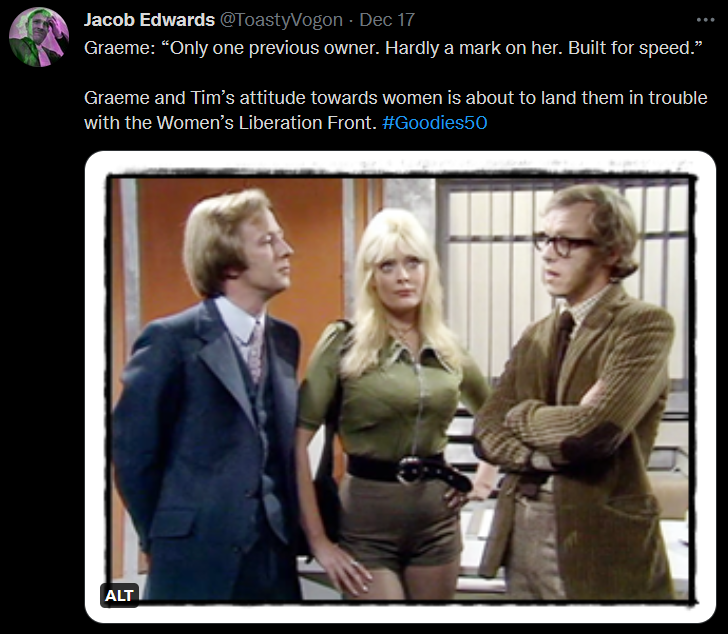
Bill, disgusted by their behaviour, reports them to the Women’s Liberation Front. Enter Barbara (Gaye Brown), a feminist force of nature who, delightfully, is dressed just like Bill!
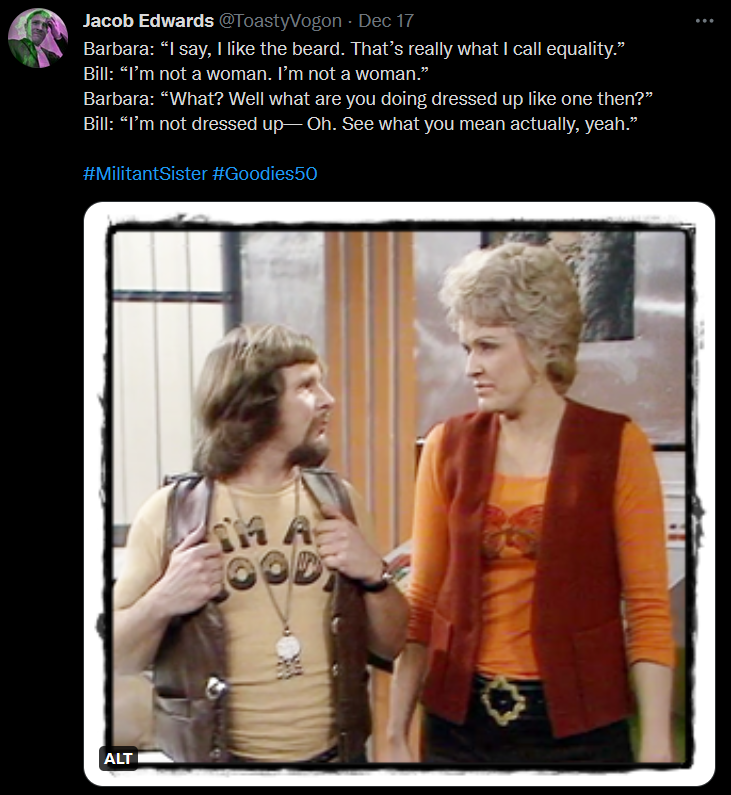
As a corrective to their obnoxious attitudes, Tim and Graeme are sent to work for Barbara’s father—himself a bluff and hearty misogynist (played by Allan Cuthbertson).[1] Graeme, as butler, is accepted into the household as one of the boys. Tim (or rather, Timbelina) is taken on as a housemaid to be treated and referred to as if she were a horse!
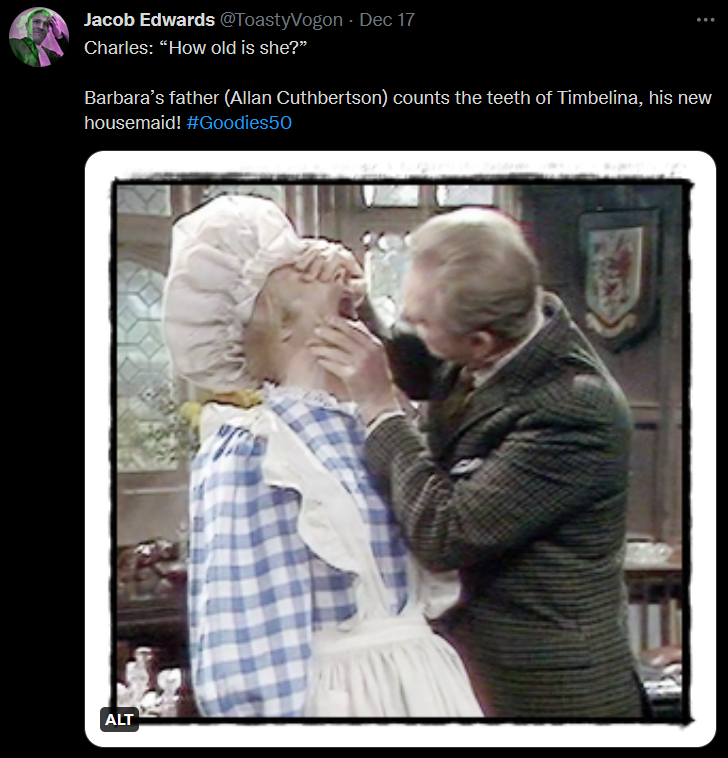
The first musical sequences, to Bill’s soul-strident protest song ‘A Woman’s Work’, are at once strikingly funny and pointedly terse, cutting close to the bone. Timbelina’s harnessed mishap with the tea trolley would go on to feature in the opening credits of Series 3 and 4. (A snippet of her dancing made it into those of Series 5 as well.) There’s exaggeration here, and the usual ludicrous take on how things should be done, but underneath that there is an acute, almost manic truthfulness. Even when Graeme plonks himself down in a collapsing deckchair—what should be a quintessentially unrelated piece of slapstick—the subservient imperative demands that Timbelina, as a woman, should suffer more… so Graeme sits on her instead!
So far, so good, for mixing comedy and feministic commentary. Even the interlude is on-point, showcasing the bikini-clad Miss Kinks as eye-candied backdrop in a shonky travel agency commercial. But when we return, the satire… goes awry.
Tim’s experience as housemaid has converted him to the cause. From now on he will be a fervent supporter of women’s lib! In fact, Tim now identifies a woman:

This is brilliant stuff, and by rights should underpin the rest of the episode. Instead, however, the lads lose sight of their message. It starts when Graeme dismisses Tim’s newfound idealism and produces another totty (from the broom closet!). This young lady appears contentedly docile in her lack of liberation. She smiles when Graeme fetches her, then again when he claims to own her, and a third time when he starts looking for the receipt(!). Her peace of mind, however, is threatened whenever Tim urges her to throw off her male chauvinist oppressor. “Stick up for your principles,” Tim exhorts, aglow with vicarious pride. “Uphold the role of womanhood!” The erstwhile totty’s reaction is indeed to show some spunk, but not as we might expect. “You’re a loony!” she decries at Tim, before shoving violently past Graeme and making her exit. This is unimpeachable comedy (of the unexpected) but hard to reconcile with any feminist message.
Next, Graeme falls in love with his computer (a logical progression from his stance that women are intellectually inferior). This development is inspired, comedically speaking, and once more there’s a highlight visual for the opening credits (Series 3-5): Graeme and his boxy electronic love skipping through the forest (to the flower-powered acoustic love song ‘Maybe’)! But what happens to the feminism?
Gaye Brown would later appear in A Clockwork Orange and The Rocky Horror Picture Show, and is scripted in ‘Women’s Lib’ as a freakishly atypical woman. Not only is she monstrously tall compared to the diminutive Bill, but in the first half of the episode she is aggressive in her body language and assertive in her speech; or in other words, characteristically masculine. Though there is obvious comic potential to be mined from reversing the male/female dynamic, by today’s standards this pigeonholing of feminists as butch seems itself rather clumsy, and certainly less progressive than the lads probably intended.
In the second half of the episode, Bill becomes Barbara’s pampered plaything to be doted upon and looked after. Barbara herself turns into a gushing suitor. In other words, the Goodies’ subversion of male/female courtship stereotypes offers nothing more profound than inversion. Instead of escalation (either genuinely pro feminist or satirically against it), Barbara’s behaviour presents as regression. The role of agitator thus falls instead to Timbelina, who, now dressed as Bill and Barbara used to, chains herself to a vicar so as to put a stop to Bill and Barbara’s, and to Graeme and his computer’s, joint wedding ceremonies.
This almost makes sense. There’s an invocation here to keep fighting the good fight; to not back down from one’s ideals. ‘Oh, why can’t people stick to their principles?’ Tim laments. ‘I could have helped Barbara lead the revolution.’ But of course it was the Goodies themselves (as writers) who pulled Barbara back from championing the feminist cause. Besides which, Timbelina’s subsequent ‘marriage is slavery’ proclamation (punctuated with a generic ‘Stop it!’ sign) makes little sense in the case of these particular marriages. And what of Graeme’s human-computer romance? This is a platonic ideal dismissed a priori as being unnatural. Granted, this is good for a few laughs:
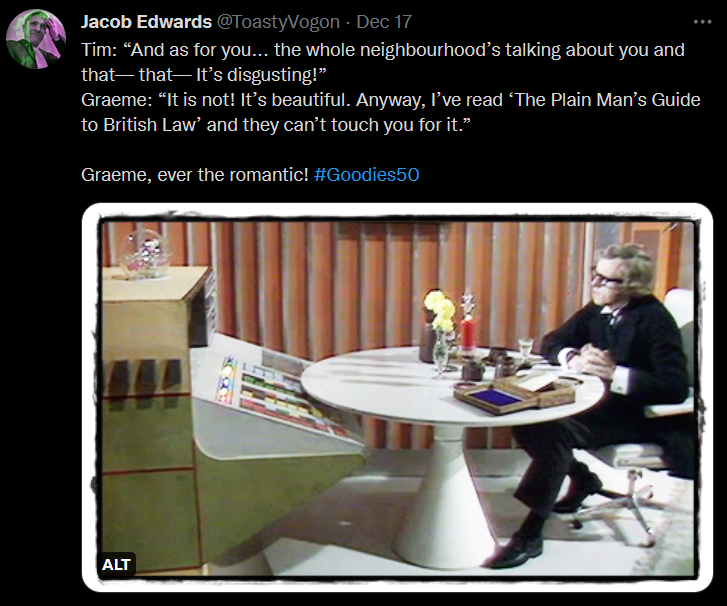
But in essence, what we’re left with is Timbelina (qua feminist) declaiming against a non-mainstream social behaviour that doesn’t match her own ideals. Given that this is how many people reacted to the early feminists, the notion sits rather uncomfortably.
At the last, Graeme abandons his wooing as ‘an insult to womankind’, and has his computer taken away. Bill agrees, and has Barbara carried off in similar fashion! It’s undeniably a funny moment, but a damningly meek end for Barbara.
In committing himself to feminist ideals, Tim/Timbelina succeeds only in admitting an underlying masculinity into the sisterhood (Trojan Horse style) and thus bringing it unstuck. The final upshot of Tim’s intervention is that he attracts the amorous attention of Barbara’s father. Whereas the old duffer never approved of Barbara’s activism, he becomes hot-blooded at Timbelina’s militancy and declares he’s going to marry her. The Goodies have to run away, leaving the status quo unchanged and the feminist movement two steps back from any step they brought it forward.
None of which is to deny the episode its humorous due. Topical barbs aside, there are comedic flourishes everywhere. When Barbara first arrives and demands ‘Who called me?’, Tim and Graeme cower behind the totty and reply ‘He did!’ They both point at Bill, except Tim does so using the totty’s hand as a proxy! Or when Bill and Barbara are lying together in the forest, with the camera feed blurred over to soften the adult nature of their romance, Bill responds by coming up with a rag and polishing the lens!
We also have Tim’s abrupt admonition of ‘Don’t try to change the subject!’ after he gets carried away joining Bill and Graeme in a refrain from ‘Some Enchanted Evening’. Then there’s the clever mis-emphasis of Bill’s skewed responses to Timbelina’s protest speech:
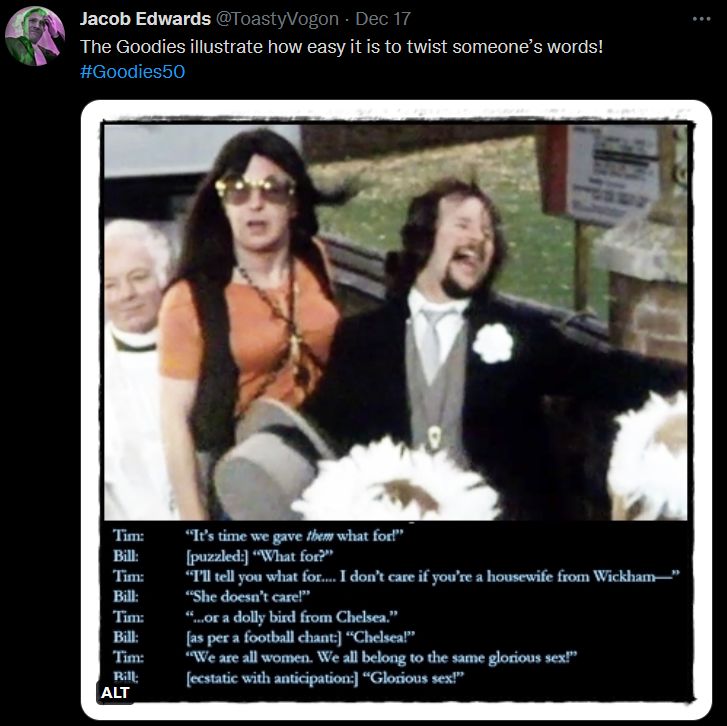
And the sequence where Graeme and Bill pack suitcases as if they’re intending to move out, only to have it revealed that they’re giving Tim the boot:
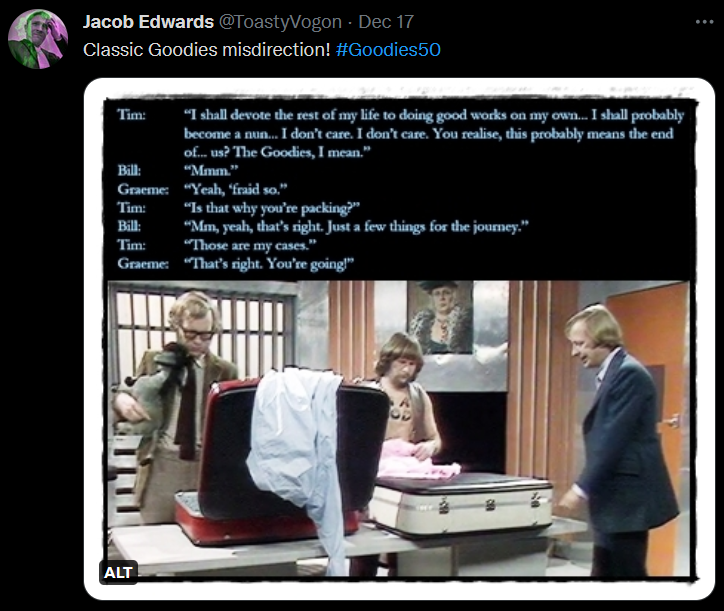
Sometimes the comedy works hand-in-glove with the message, such as when Barbara liberates Graeme’s first totty:
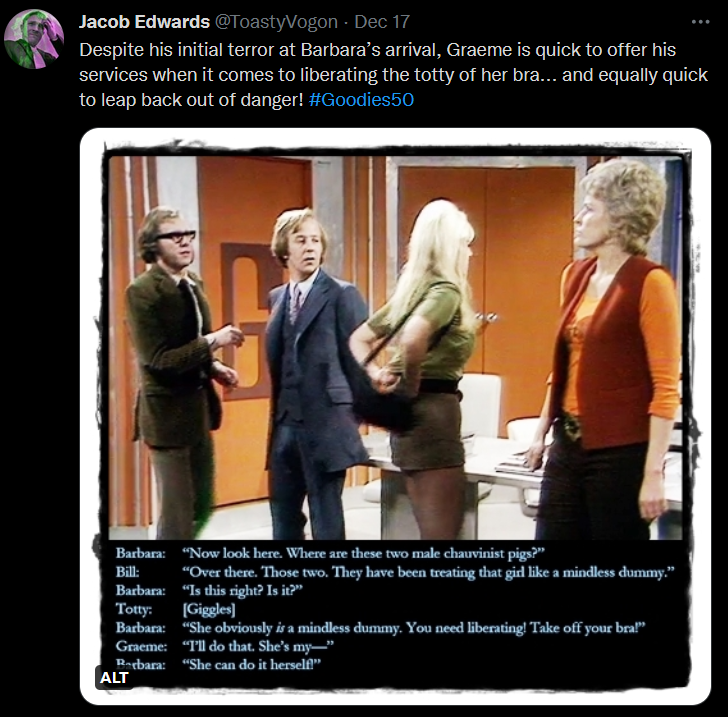
But on other occasions the Goodies sacrifice one for the other. As the credits roll, it’s hard not to think they could have done better.
Jacob Edwards, 17 December 2021
Tweets:
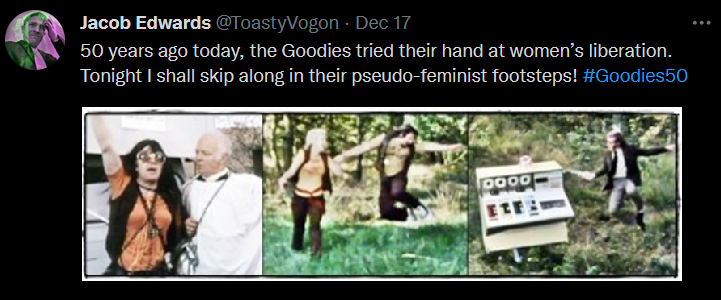
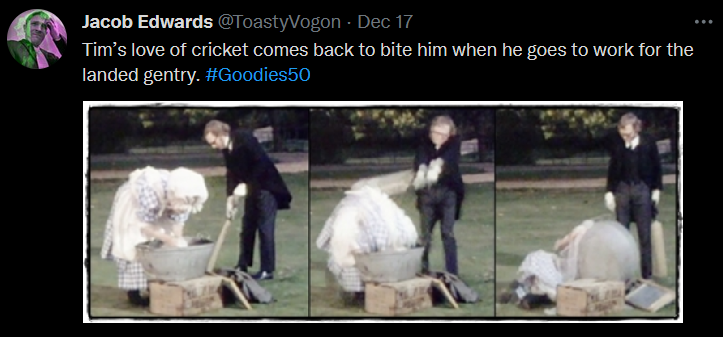
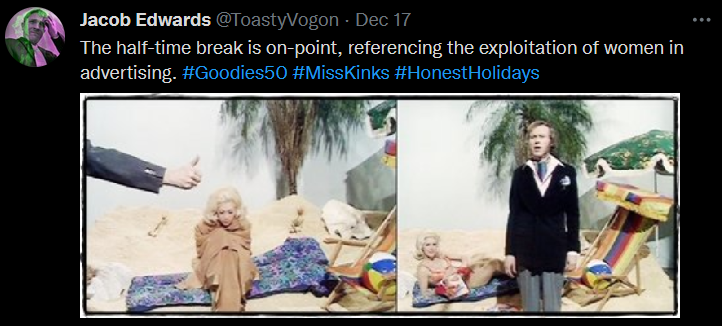
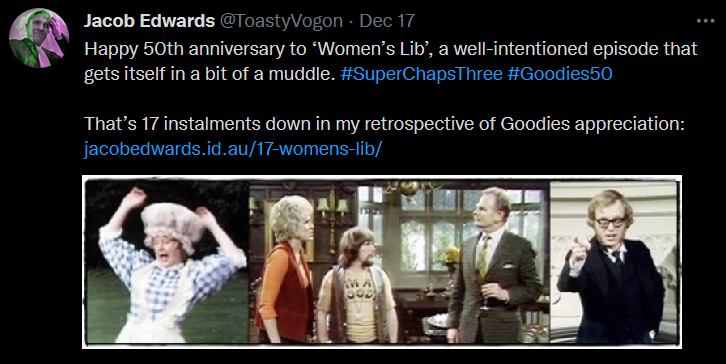
[1] Colonel Hall from the Fawlty Towers episode ‘Gourmet Night’. Ann Way, who went on to play Mrs Hall, appeared in Series 1’s ‘Cecily’. No doubt the association with Tim’s cross-dressing played its part in bringing the two guest stars together!
Previous: Farm Fresh Food
Next: Gender Education
